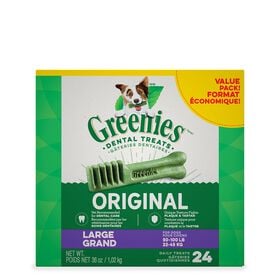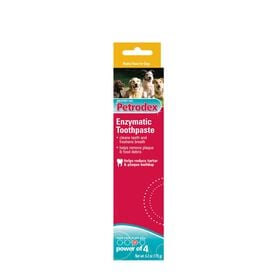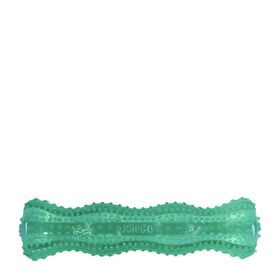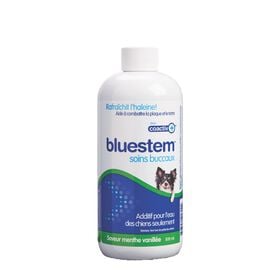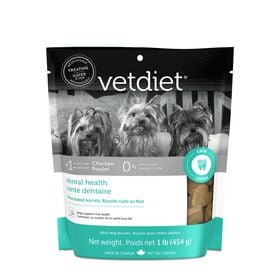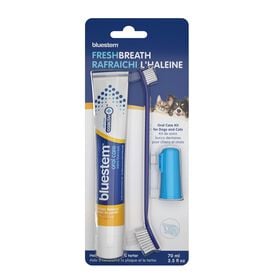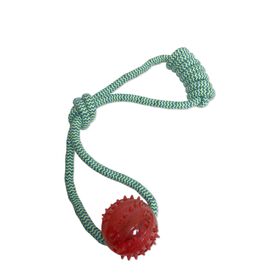
Like us, dogs require good oral hygiene to stay healthy for a long time. Don't wait for infections, foul odours, inflammation, and pain to set in your furry friend's mouth: it is crucial to establish a dental care routine from a young age.
Dental development in dogs
Dental development in dogs goes through several stages. Puppies are born without teeth, and their milk teeth start appearing in the first weeks. These teeth are small and delicate. They are generally also sharper. As the puppy grows, stronger permanent teeth will replace the milk teeth. They have a more robust shape.
By understanding these stages, you can better address your dog's specific needs at each phase of its dental development.
Signs of dental problems in dogs
Recognizing early signs of dental problems in your dog is essential for prompt intervention and maintaining oral health. Behavioural and physical changes can be key indicators.
- Persistent bad breath: foul breath can signal dental problems such as plaque or gingivitis.
- Changes in eating habits: if your dog avoids eating or prefers soft food, it may indicate dental pain.
- Red or swollen gums: irritated gums may indicate infection or gum disease.
- Visible tartar on teeth: tartar buildup can lead to more severe issues if left untreated.
Being attentive to these signals allows for quick action to prevent future complications .
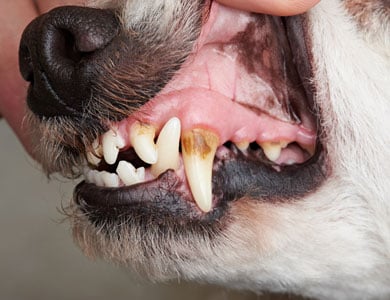
Benefits of good dental hygiene
Maintaining proper dental hygiene for your dog offers many benefits for its overall health. These care practices prevent potentially severe problems and contribute to the general well-being of your canine companion.
- Prevention of oral diseases: good dental hygiene reduces the risk of gum diseases, gingivitis, and the formation of periodontal pockets.
- Reduced risk of infections: clean teeth limit the risks of dental diseases, which can affect other organs.
- Improved digestion: healthy teeth facilitate chewing, contributing to effective digestion.
- Impact on behaviour: dental pain in dogs can cause behavioral changes. Taking good care of your dog's teeth can help prevent these issues.
Investing in your dog's dental health is a proactive step to ensure a healthier life.
Also read: 10 common causes of bad breath in dogs and cats
Choice of dental hygiene products
Choosing dental products specifically designed for dogs to maintain their optimal dental hygiene is essential.
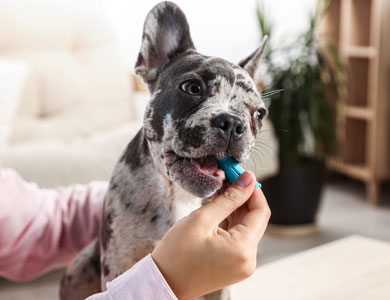
Toothbrush
Your dog's toothbrush should have soft bristles suitable for their gums and be appropriate for their size.
Toothpaste
Opt for a toothpaste with a pleasant taste to encourage your dog's cooperation during brushing. Never use products intended for humans, as some ingredients can be toxic to dogs.
Tips for brushing your dog's teeth
Brushing your dog's teeth may seem daunting, but with the proper techniques and patience, you can make this activity beneficial and enjoyable for both of you. Here are some tips for effective brushing.
Teeth brushing routine
- Handle their mouth and gently run your fingers over their gums and teeth. Reward your dog for cooperation. Positive reinforcement is essential to build trust with your pet.
- Add toothpaste to your finger to get them used to the taste and texture. Toothpaste flavours like mint, vanilla, malt, or chicken are generally well-tolerated by animals.
- Then, introduce a soft toothbrush or a plastic fingerbrush that fits over your finger. Brush your dog's teeth with gentle circular motions to avoid irritating their gums. Only do it for a few seconds to start. Reward their cooperation and patience with a treat or affection.
- Pay special attention to the outer teeth, where dental plaque accumulates.
- Gradually extend the brushing sessions for effective cleaning. Try to brush your dog's teeth at least three times a week or even daily. Maintain consistency in your brushing routine for optimal results and better prevention of dental problems.
Teeth brushing can become a special bonding moment between you and your dog, strengthening your relationship while preserving their dental health.
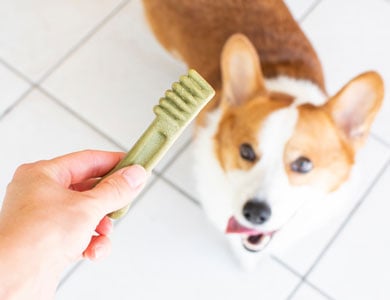
Diet and its impact on dogs' dental health
Choosing suitable food and treats can significantly improve your dog's dental health. It can help reduce plaque formation and maintain healthy gums by incorporating specific options into their daily diet.
Dental food
Dental food plays a crucial role in dogs' dental health. Prioritize high-quality dental food. These foods are specially designed to perform mechanical brushing due to the shape and size of the kibble, in addition to the enzymes they contain that target plaque.
Toys and dental treats
Chewing toys and treats also play an essential role. Chewing helps dislodge accumulated food, and the mechanical friction prevents plaque buildup while maintaining healthy gums.
At the vet
It's important to take your dog for regular visits to the veterinarian to maintain their dental health. During the annual examination, the veterinarian will visually assess the condition of your dog's teeth and gums to identify any potential issues and prevent them from worsening. If there is any tartar buildup, damaged teeth, or other dental conditions, the veterinarian will notify you. Scaling and polishing are also recommended to clean your dog's teeth thoroughly.
Moreover, your veterinarian can provide specific advice based on your dog's unique dental health, including diet and at-home care recommendations. Planning regular visits to the veterinarian ensures constant monitoring of your dog's dental health, contributing to preventing and treating problems at an early stage.
Also read: Your pet's dental hygiene: everything you need to know
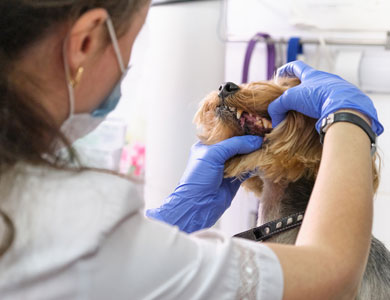
Did you know...
- Poor oral hygiene in dogs can lead to heart problems. The bacteria in their mouth can spread into the bloodstream and cause damage to internal organs.
- Moreover, bacterial buildup around the roots of teeth can weaken the bones and even cause jaw fractures in severe cases.
- Animals do not always show pain. If your dog eats less and loses weight, consider having it examined. Tooth loss, dental abscesses, fractures, and gingivitis are discomfort causes that can decrease food intake.
Some veterinarians specializing in dentistry can perform more advanced treatments if your dog has specific needs, such as root canal treatments, fracture repairs, complex extractions, etc.
For information on dental health products, brushing techniques, and recommended food and treats for your dog, please consult an in-store advisor.
Remember: prevention is key! By following these tips, you help your dog maintain good dental health and invest in its overall well-being. Healthy teeth mean a happier, more active, and healthier dog.


